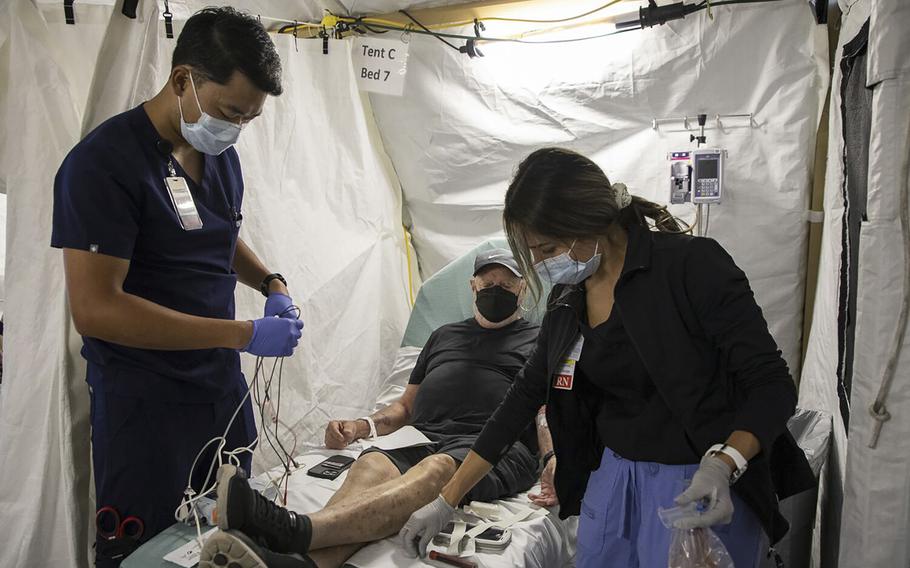
David Tran, an emergency department technician, left, prepares to put a cardiac monitor on a patient as he has his blood drawn by Jessica Smith, a registered nurse, at Scripps Memorial Hospital Encinitas on Nov. 11, 2022, in Encinitas, California. Scripps recently opened an overflow tent outside of the hospital after an increase of flu patients. (Ana Ramirez/San Diego Union-Tribune/TNS)
Stars and Stripes is making stories on the coronavirus pandemic available free of charge. See more stories here. Sign up for our daily coronavirus newsletter here. Please support our journalism with a subscription.
(Tribune News Service) — Trying to avert a heavy surge in respiratory illnesses, California’s leading public health officials once again stressed on Tuesday that state residents should do all they can to prevent the spread of COVID-19, the flu and respiratory syncytial virus, or RSV, as they gather for the holidays.
“As we prepare for Thanksgiving and holiday gatherings, we need to continue being vigilant in preventing the rapid spread of winter viruses,” said Dr. Erica Pan, the state epidemiologist. “It is concerning to see the rise in RSV and flu in babies, young children and our elderly population. It is crucial we are aware of prevention methods, but also, how to care for our loved ones at home, and what symptoms to be aware of for parents to seek care for their children.”
Pan’s has focused her career on treating and preventing illness in children as a pediatric infectious disease physician and a public health official. She and other state public health officials have warned that all three viruses, a so-called tripledemic, are ramping up around the state.
In Sacramento, Citrus Heights, Rancho Cordova and Elk Grove, flu virus is showing up at more than twice the level it was 15 days ago, according to an analysis of sewer samples by Stanford University. Levels of both COVID-19 and RSV have risen sharply over the last two weeks.
Vaccines and booster shots for flu and COVID-19 continue to be the best way to prevent illness, Pan said. Unvaccinated people were 3.1 times more likely to die from COVID-19 than people who were vaccinated with at least a primary series, according to the latest COVID-19 data from the state.
Public health officials also recommend that those who are sick stay home to prevent the spread of these diseases. Even if you’re well, wear a mask when you’re out and about, they suggested, and wash your hands frequently.
If you or a family member get sick, Pan has some suggestions for treating the viruses at home:
• Use a nasal saline solution to help improve breathing, and for infants, suction mucus from the nose.
• A cool mist humidifier also can help clear congestion.
• Sit or lie upright to improve breathing.
• Drink plenty of clear fluids to prevent dehydration: water, broth, sports beverages or Pedialyte for kids.
• Acetaminophen and ibuprofen can be given to individuals 6 months or older to help control fever. Aspirin can cause a rare but serious illness in infants and children, so it is not recommended. For babies younger than 6 months, consult your health care provider before administering a pain reliever.
These tips will help most children fight off mild viral infections, Pan said, but consult a doctor or seek hospital care in these cases:
• If breathing seems difficult. Are they breathing fast? Are their nostrils flaring? Is their head bobbing? Are they grunting or wheezing while breathing? Are they fully engaging their diaphragm in an attempt to take in air? Are they pausing when breathing?
• If your child has a gray or blue color to their skin.
• If they show signs of dehydration — a parched mouth, urinating less frequently, fewer tears when crying, playing less than usual. In infants, the soft spot at the top of the head may be sunken.
Your doctor won’t likely test for RSV, Pan said, because the diagnosis won’t change the recommended treatment.
©2022 The Sacramento Bee.
Visit sacbee.com.
Distributed by Tribune Content Agency, LLC.